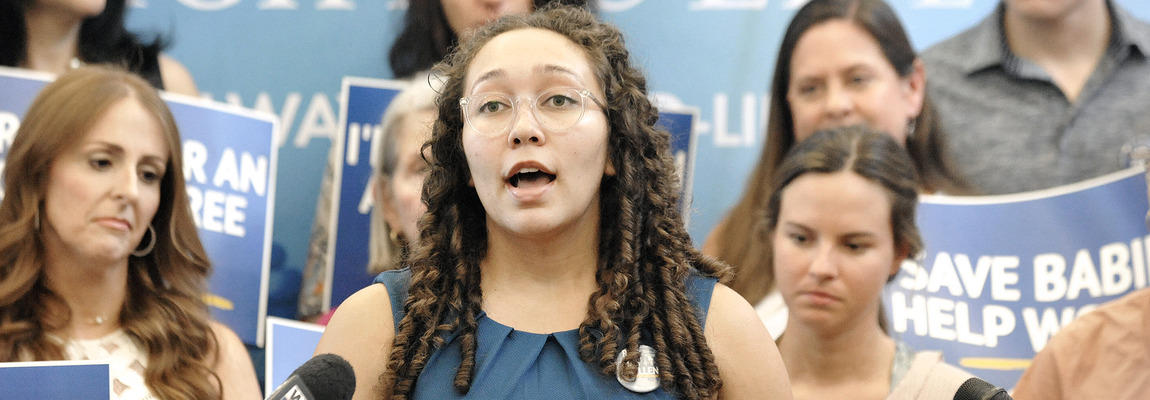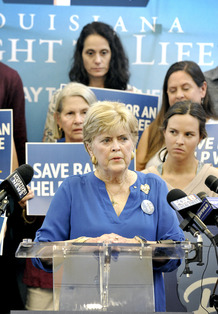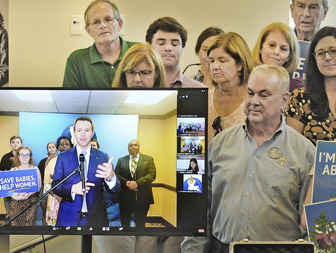
A platform that encourages healthy conversation, spiritual support, growth and fellowship

NOLACatholic Parenting Podcast
A natural progression of our weekly column in the Clarion Herald and blog

The best in Catholic news and inspiration - wherever you are!
Court ends half-century of Roe rule
-

By Peter Finney Jr.
Clarion HeraldIn one corner of the room stood Sharon Ryan Rodi, who as a former Dominican High School graduate and a 30-year-old mother with two babies in the early 1970s recoiled in disbelief when she tried to absorb the calculated attack on human life unleashed by a U.S. Supreme Court ruling that would allow abortion on demand.
In the other corner was Ashley Gilliam, a recent graduate of Tulane University, all of 22 years old, whose entire life has been shrouded by the dark veil Rodi tirelessly has worked nearly a half-century to lift.
 Across the generations
Across the generations
It was easy to see the mutual admiration society on display: Rodi, the lioness whose sole purpose in life has been the motherly protection of her young, and Gilliam, the cub who has drawn inspiration and a sense of urgency from Rodi and other women like her who put everything on the line for a moral cause that deeply mattered.“I’m just amazed,” Gilliam said, glancing over at Rodi after Louisiana Right to Life (LRTL) heralded the Supreme Court’s landmark decision June 24 to overturn the Roe and Casey decisions that had enshrined abortion rights for nearly 50 years.
“I feel I was so lucky to have met these women, and I’ve only met them in the last year and a half,” said Gilliam, a native of Arizona who is director of youth programs for LRTL. “I’m so lucky to be able to look up to these strong, powerful women. These are strong women, these are mothers, they’re intelligent. They stand for what they believe – and, I’m honored to be here.”
Rodi spoke just briefly during the 25-minute press conference, but afterwards, she was smiling and almost speechless. When she joined local attorney Bob Winn and others to fight the abortion license in 1973 and persuade women that there was a better way, she had always dreamed of the day when Roe would be overturned.
But, deep down, Rodi admitted, she didn’t think she would live to see the day.
“No, no,” she said.
And now that it has happened?
“I’ll probably start crying talking about it,” said Rodi, who went to Loyola Law School at night at the age of 44 to continue her advocacy. “When it happened, when the decision was announced, I was so emotional because it’s like, what do we do now? How are we really going to be able to help people? I think there has to be more outreach, more ability just to get to the issue of family. You’re fighting against television – sex is great, have a good time. We’ve got to back up and look at the family.”
Using science to advocate
Starting out as a Tulane undergrad, Gilliam was a pre-med major and later shifted to molecular biology. She became president of the university’s pro-life club, which brought her into direct contact with young people totally opposed to her views on the sanctity of human life.“As I grew, I thought my calling was to work with pro-life activism,” Gilliam said. “A lot of times when I talk to students I hear the fear and the confusion, and I think this is where a lot of this is coming from. I hear from women who are afraid that if they end up in an unplanned pregnancy, there will be no resources because they don’t know about the resources we have in the state.
“There’s also confusion about the science of the unborn person inside the womb. That’s why when we speak to students, we’re really kind and loving and compassionate. That allows people to open up their minds, and we can have that conversation and we can find the truth together.”
Archbishop Hannan issued ‘call’
Rodi said when she joined the pro-life movement in 1973 – she responded to a general call from Archbishop Philip Hannan – abortion was so foreign to her that she didn’t even know what it meant to have one.“But I thought of the women who were faced with that decision and thought they needed to take the life of their child in order to survive,” said Rodi, who helped establish a health and pregnancy center in the archdiocese. “I went to that meeting, and that meeting changed the course of my life over the next 50 years. We try to help pregnant women choose life rather than abortion, because abortion doesn’t provide what they are looking for. It only takes the life of their child. It provides two victims, not just one.”
Just as Rodi worked with legislators to craft laws over the years that would nibble away at the abortion license, she said the real work will be in changing the “hearts” of men and women who feel that abortion is a fundamental tenet of women’s equality in the workplace.
“The fight is in changing hearts and minds,” Rodi said.”People need to realize that these are living human beings, and we are taking children’s lives. We know so much more than we knew 49 years ago when Roe v. Wade was decided. When we destroy life, we are showing a total disrespect for life. If we think we have violence in our communities today, look to what the source of that violence is. If we don’t respect the life of the defenseless unborn, how do we expect to respect the life of others who are born?”
Louisiana is one of 13 states in the country that passed a “trigger” law that would impose a ban on abortions in the state as soon as Roe v. Wade was overturned. One of the state’s three abortion clinics – Hope Medical Group in Shreveport – successfully won a temporary restraining order from Orleans Parish Civil District Judge Robin Giarrusso, which could allow abortions to continue in the state until a full hearing on July 8.
 Law now on pro-life side
Law now on pro-life side
Benjamin Clapper, executive director of LRTL, said he was confident that the abortion ban would be upheld in short order.“For nearly 50 years, abortion has been legal,” Clapper said. “We want babies to be protected yesterday, obviously, but we believe in time, our law will be victorious and life will prevail. These legal proceedings will go away, and we’re going to be able to protect babies in Louisiana and continue our shared work in the whole community of helping moms and helping babies in need.”
Clapper said there were 7,444 abortions in the state in 2021, with the Shreveport facility accounting for about 40% of those. There are abortion facilities in Baton Rouge and in New Orleans (on General Pershing Street).
The Planned Parenthood Clinic in New Orleans, Clapper said, has been unable to get a state license to perform abortions since it opened in 2015.
“Planned Parenthood has been trying for years to get a license to do abortions in New Orleans,” Clapper said. “They do not have that license, so they should never have been performing abortions, which is a big success that the whole community can really be celebrating – that they’ve never been able to perform abortions in New Orleans.”
In the week after the June 24 decision, Clapper said he has been buoyed by the response from pro-life advocates, such as Rodi, who have been in the battle for the long haul.
“Certainly, there’s a lot of people who are excited, people who’ve been working on this since 1973,” Clapper said. “So that, to me, is one of the most encouraging moments, just seeing that joy, that excitement of knowing that they’ve been working their whole life to protect these precious unborn children. It’s such an obstacle that’s been torn down. That has been really beautiful and wonderful to see.”
Clapper also noted that some of the dissent arising from the recent decision is based on misinformation.
“What’s been disappointing to me is the plethora of misinformation that’s out there in the public about pro-life laws – claims that women are going to be dying because they can’t access procedures to help them in cases of ectopic pregnancies or that miscarriages somehow are going to be affected by this,” Clapper said. “There’s just this wide misinformation campaign.
“Our laws are very clear – that when a woman’s life is in danger, physicians can work to save her life and the life of her baby. When a woman has an ectopic pregnancy, then the physician can take the appropriate standard of care – medical action – to save her life in those situations. When a woman has a miscarriage, a physician can do everything that they need to do to help that woman handle a miscarriage. What is not protected is the destruction of innocent human life through elective abortion. That’s what our laws prevent.”
RU-486 defined as abortion
Using the RU-486 abortion pill to end a pregnancy is defined under Louisiana law as an abortion, Clapper said, “so the same restrictions that would apply to a surgical abortion, in terms of it being illegal, would be applied to the chemical abortion. We would expect that chemical abortion pills can’t be given in the same way that surgical abortions can’t be done. We’ve also been trying to stop and make illegal the sale of chemical abortions from out of state, from being shipped into Louisiana.”Clapper said a chemical abortion is different than the “morning after” pill (Plan B).
“Regardless of what someone’s opinion may be about Plan B, that’s not defined as an abortion under Louisiana law,” he said, “and so that would remain legal in Louisiana.”
As for the spate of national companies announcing that they would defray the costs for employees who work in states where there is no abortion access to travel to states where abortion is legal, Clapper said such anti-family logic is disappointing.
“It’s really sad that corporate companies think they have a fiscal interest in paying for abortion rather than for maternity coverage and for maternity leave,” Clapper said. “Which is going to be more expensive in that situation? Well, maternity leave is going to be more expensive than abortion.”
“I don’t think they’ve really thought through the implications of how this actually plays out in the workplace. But we think it’s sad. We need to be helping women with real positive, affirming solutions rather than just trying to throw money at abortion in every situation to supposedly take care of the problem. This is almost subtle coercion. It’s just going to make it worse. So I hope they rethink that consideration.”




